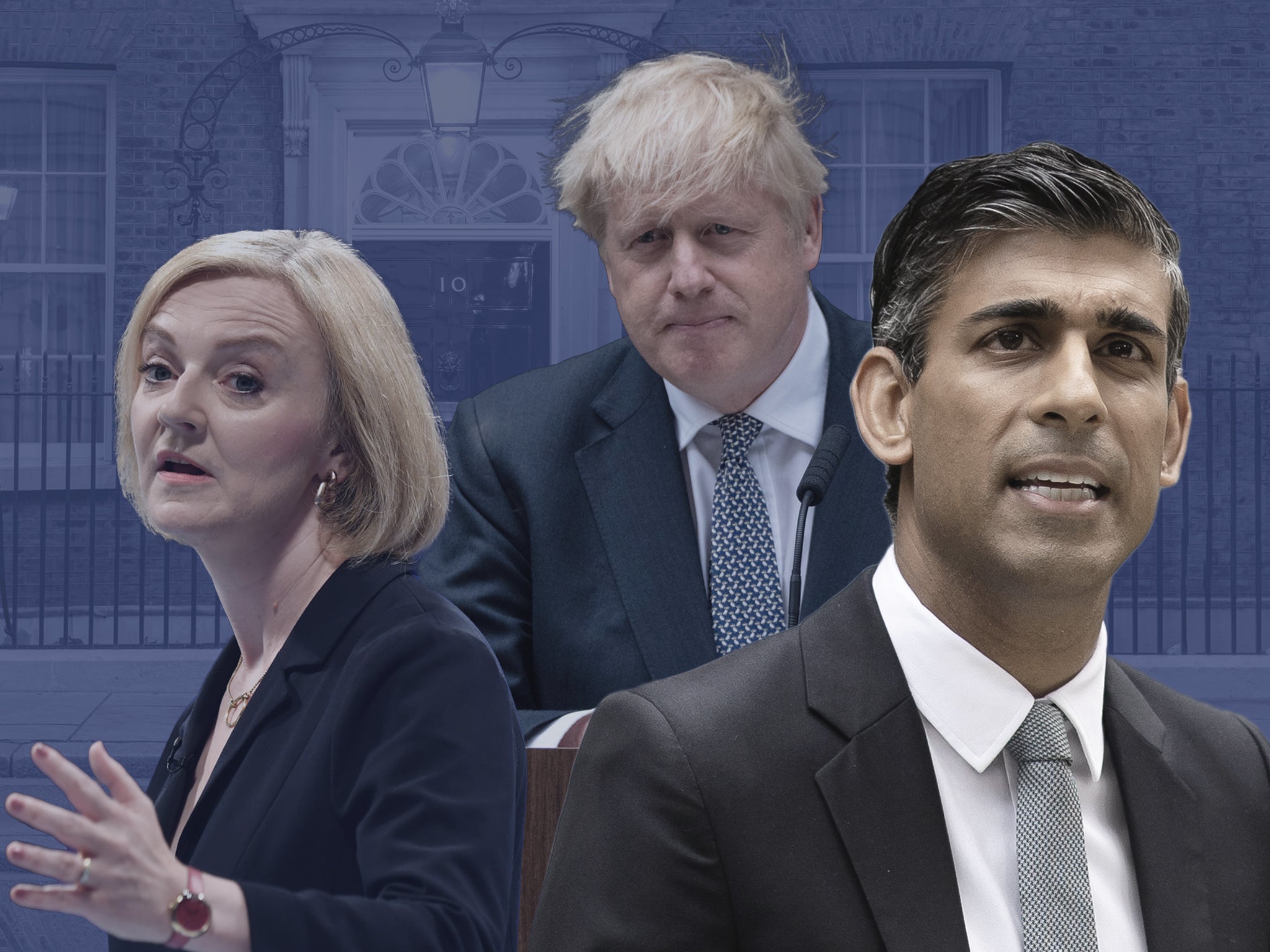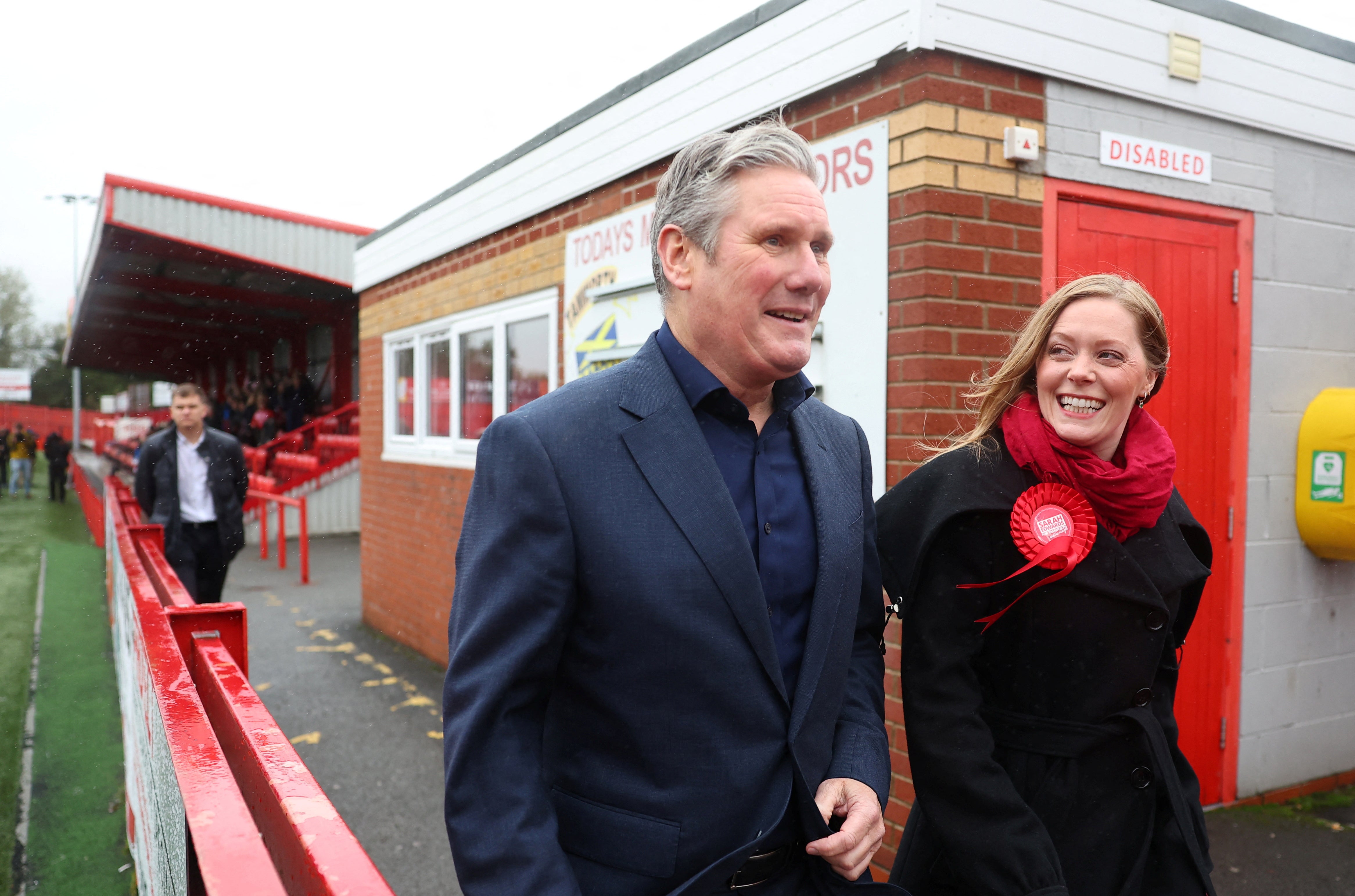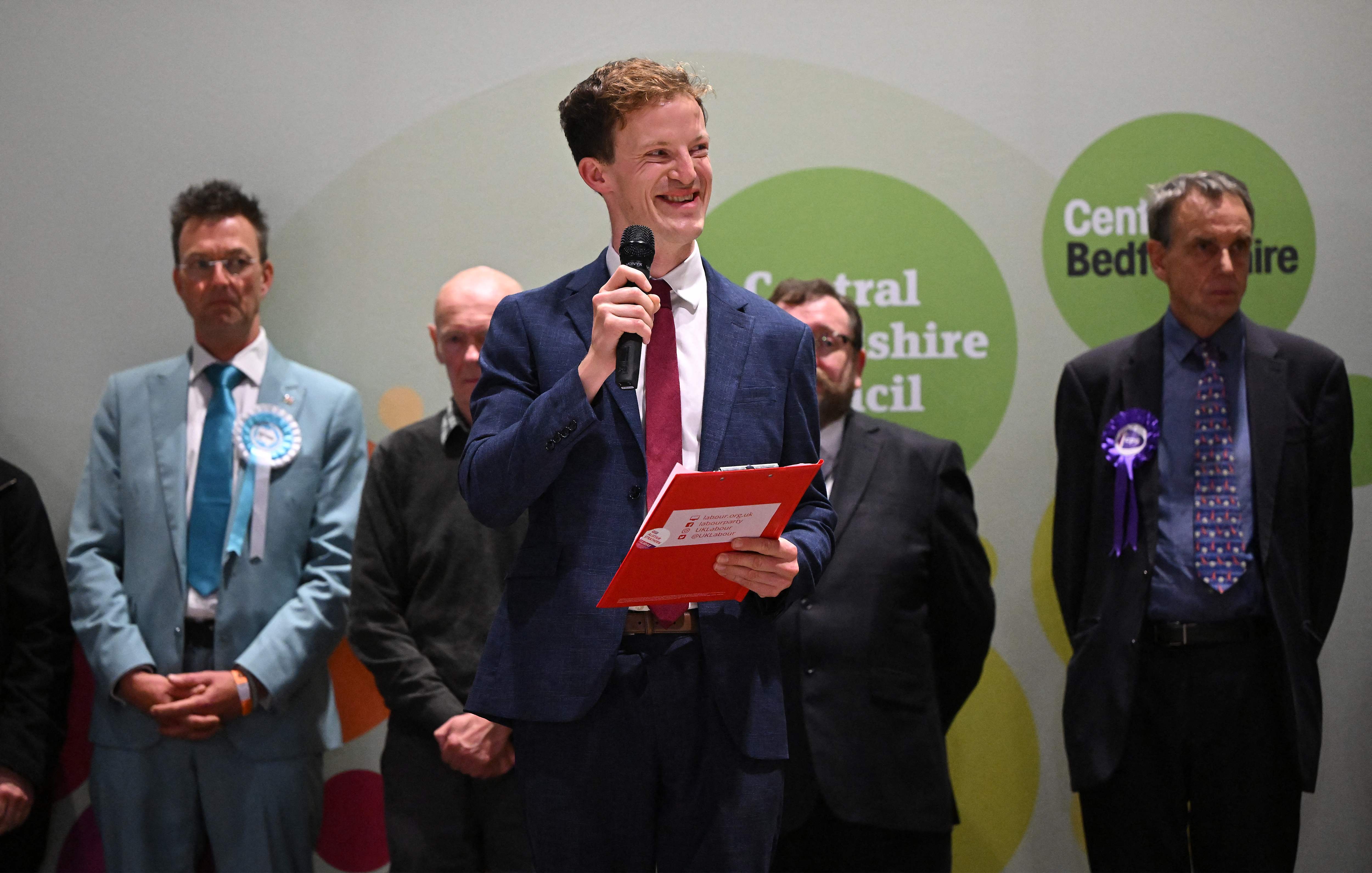Wipeout: from partygate to election apocalypse — the lies and cowardice that detonated the Tory party
It’s the tale of two Tories who blew up the party that won the last four elections — Boris Johnson, finally overwhelmed after Partygate and a lifetime of lies, and his economically reckless successor, Liz Truss. Together, writes Andrew Grice, they dealt Rishi Sunak an impossible hand and set a course for by-election humiliation and general election oblivion


“We are still being punished for Johnson and Truss,” one minister said ruefully as the Conservative Party surveyed the wreckage of its two crushing by-election defeats at Labour’s hands in Tamworth and Mid Bedfordshire.
One senior Tory who had canvassed in both contests said the “anger on the doorsteps” was not directed at Rishi Sunak but at “the last few years”. A Labour insider agreed, telling me: “The Tories are still paying the price for Partygate and the financial market crash.”
Although Sunak – remarkably – still hasn’t given up hope of defying political gravity by holding on to power at next year’s general election, many Tories think privately that his mission is now impossible. Minds are already turning to who will succeed him as Tory leader, and to a bitter inquest to establish who were the detonators who blew up a party that has won the last four elections.
Boris Johnson will surely top the Tories’ list. After his thumping 2019 election victory, he had credible hopes of 10 years in Downing Street. Yet the characteristics of the man who bulldozed Brexit through parliament, the “not typical Tory” who wowed the red wall, would soon become self-destructive.
He was not brought down by Sunak, as Johnson’s acolytes unconvincingly still insist, but by himself. The Tories’ in-joke is true: he brought down three prime ministers – David Cameron, Theresa May, and... Boris Johnson. He got away with his lies for a large part of his life, including during the 2016 Brexit referendum, but they finally caught up with him on Partygate. That scandal highlighted another fatal flaw: he believed that the rules applied only to the little people, not to giants like him.

His casual relationship with the truth wasn’t just about Partygate. Johnson was accused by Dominic Cummings of secretly trying to arrange for wealthy Tory donors to pay for a £112,000 revamp of his Downing Street flat. The adviser on ministerial interests was furious to learn that Johnson had exchanged WhatsApp messages with one donor, but said that he had not breached the ministerial code.
Johnson was investigated by the police watchdog over his relationship with the American businesswoman Jennifer Arcuri, who said she had a four-year affair with him while he was London mayor. Her tech company received £25,000 of public funds. The watchdog said Johnson should have declared an interest and may have breached the London Assembly’s code of conduct. Johnson denied any wrongdoing.
He was forced to apologise to parliament for failing properly to declare outside earnings – totalling more than £50,000 – on nine separate occasions. The standards commissioner found that the failings were not inadvertent, and that they demonstrated a lack of regard for the rules.
The Tories should have been forewarned: Johnson was sacked from the front bench by Michael Howard in 2004 for lying about an affair. Even before that, he was fired by The Times in 1998 for making up a quote.
Johnson was a brilliant campaigner, as events in 2016 and 2019 showed. But he was an awful prime minister. Even before the pandemic blew his government off course – and remarkably, just weeks after he had won a majority of 80 at the 2019 election – his close ally, Cummings, was discussing how to oust him because he was not up to the job. As one Tory insider told me: “Boris was a good mayor [of London] and brilliant after-dinner speaker, but should never have become prime minister.” Michael Gove got it right in 2016 when he knifed Johnson in the front, sabotaging his leadership campaign by saying that Johnson was incapable of “leading the party and the country in the way that I would have hoped”.
Johnson was accused of cowardice then, and it has stuck. He backed away from an attempted comeback when Liz Truss resigned. Then, after being found guilty by the Commons privileges committee of misleading parliament on Partygate, he ducked a by-election in his Uxbridge and South Ruislip constituency by standing down. We will never know whether he would have won it, but his party’s surprise victory must leave a nagging doubt in his mind. Some Tories think he would have won on a ticket opposing the expansion of London’s ultra-low-emission zone (Ulez); others that he would have become the story, and lost.

Thursday’s by-elections suggest that the Tories are still afflicted by what some party insiders call “long Boris”. The Tamworth contest was caused by the resignation of Chris Pincher, who, like Johnson, quit parliament rather than face a recall by-election, after losing his appeal against a suspension for drunkenly groping two men.
Pincher was one of Johnson’s small band of ultra-loyal acolytes. The then prime minister made Pincher his deputy chief whip last year, despite knowing of previous complaints about his behaviour – a reward for Pincher’s role in saving Johnson’s skin when the Partygate affair blew up.
Johnson could argue that he is loyal to his friends. But he repeatedly tried to bend the rules in his efforts to save them. The first act in his downfall, when he was still riding high after his finest hour at the 2019 election, was to try to save the neck of fellow Brexiteer Owen Paterson after he broke Commons rules on lobbying. Johnson showed the same insensitivity when he refused to sack Cummings for his trip to Durham during lockdown – another of the “one rule for us” controversies that became real-world stories and tarnished the Tories’ reputation.
Inevitably, Johnson tried to save Pincher, and was reluctant to see him lose the Tory whip. Ministers claimed (wrongly) that he was unaware of Pincher’s past transgressions, fitting a pattern of behaviour by the PM: dismiss any controversy as a media storm that will blow out, and be economical with the truth in the meantime.
Johnson finally ran out of road with his own party over his handling of the Pincher saga. To a party still reeling from Partygate, it showed that Johnson was incapable of changing his terrible ways. In the summer of last year, he was swept out of No 10 by an avalanche of ministerial resignations, started by Sajid Javid and Sunak, who quit as chancellor. Sunak told Johnson woundingly that “the public rightly expect government to be conducted properly, competently and seriously”.
Johnson’s departure was not the end of the damage inflicted on the Tories by him and his fan club. Nadine Dorries, his cheerleader-in-chief, was upset that Johnson’s attempt to hand her a peerage was blocked, and petulantly triggered a by-election in her Mid Bedfordshire constituency. Held by the Tories since 1931, it went Labour on Thursday. Earlier, Nigel Adams, a Johnson ally who had also been denied a peerage, quit the Commons in an apparent attempt to destabilise Sunak. Labour won the ensuing by-election in Selby and Ainsty with another 20-per-cent-plus swing.
So Johnson is the common thread running through three humiliating by-election defeats for Sunak. The antics of Dorries and Adams illustrate how some in the Tory party are prepared to harm the party in order to pursue the lost cause of Johnson, and even attempt to preserve the myth that one day he might return to Downing Street.
A parade of ministerial resignations, far more than usual outside reshuffles, added to the Tories’ brand damage. They included those of Dominic Raab, the deputy prime minister, who quit after bullying allegations he denied.
Nadhim Zahawi was sacked as Tory chair for breaching the ministerial code over his tax affairs. A ministerial merry-go-round, which left the public’s heads spinning, saw Suella Braverman resign as home secretary for breaking the code but return six days later. It portrayed a party that had lost the plot after a long spell in power and was self-destructing in front of the voters’ eyes.
It’s not all about personalities. On policy, the Tories failed to “make Brexit work” on two levels: the friction of their threadbare trade deal harmed business and growth, and they failed to reap the benefit politically, as Johnson had done in 2019. The Tories’ defeat in the strongly Leave-supporting seat of Tamworth underlines this, suggesting that Brexit is in the rear-view mirror. With public opinion now in favour of rejoining the EU – the latest poll putting it neatly at 52 per cent versus 48 per cent for staying out – it’s clear that many people who supported Brexit feel they were misled. Another one for Johnson’s list of lies.

Anthony Seldon, the historian and co-author of Johnson at 10, wrote: “A top tier prime minister would, unlike him, have worked ferociously hard to drive through the benefits of Brexit and to show definitively that the decision had been the right one for the country.” Seldon concluded: “Johnson had the potential, the aspirations and the opportunity to become one of Britain’s great prime ministers. His unequivocal exclusion from that club can be laid at the feet of no one else, but himself.”
The Tories, a ruthless election-winning machine, might just have managed to put the Johnson era behind them and convince voters he was an aberration if their grassroots members had chosen Sunak as his successor. But they opted instead for Truss, ignoring Sunak’s warnings about her economic strategy. It blew up her government within 49 days, making her the shortest-serving PM in history, and compounding the damage to the Tories by throwing away the party’s reputation for economic competence.
Part of the blame lies with Kwasi Kwarteng, Truss’s (now former) close friend and ally, who was her chancellor. His mini-Budget, with £45bn of unfunded tax cuts including the abolition of the 45p top income tax rate, crashed on take-off, provoking a meltdown in the financial markets, a hike in government borrowing costs, and mortgage misery for millions, which Labour has pinned round the Tories’ necks. The chancellor made things worse by promising there were more tax cuts to come.
However, most of the blame should rest at Truss’s door. She was reckless, losing the markets’ confidence by needlessly sacking the Treasury’s top civil servant and sidelining the Office for Budget Responsibility. Kwarteng urged her to “slow down” and said later that she had felt “invincible, almost regal”.
To try to save herself, Truss brutally sacked Kwarteng, who read about his departure on Twitter. He has been more willing to admit his mistakes than an unrepentant Truss, who often resorts to blaming them on the old chestnut of poor communications. Like Johnson, she is a ghost at what should be Sunak’s feast. Her brazen appearance at this month’s Tory conference was another sign that the detonators are quite happy to let off more bombs, even if it means more damage to their party. For some Tories, this tendency has ominous echoes of the 1992-97 period, when Eurosceptic rebels put that cause above party unity, harming John Major’s prospects at the next election.
When the history books are written, they might well record that Sunak inherited an impossible hand, thanks to the deadly duo of Johnson and Truss. However, part of the blame might lie much closer to home: when More in Common, which carries out opinion polls and holds focus groups, asked people this week what they thought of Sunak, the option most chose was “Out of touch”. (For Keir Starmer, it was “Don’t know enough to say”.)
The prime minister tried to distance himself from his two predecessors at the Tory conference. But he pulled his punches, bracketing them with the governments during a failed consensus over the past 30 years since the Thatcher era. As one Tory MP quipped: “What the hell has John Major got to do with it?”
Sunak knows that a full-frontal attack on Johnson or Truss would see their allies return fire, presenting voters with a picture of a party in civil war. So far, he has put party unity first, tacking left and right to avoid divisive Commons votes. Yet all leaders to some extent define themselves against their own party in the voters’ eyes, and Sunak will need to disown the deadly duo who blew up the Tories if he is to make a credible offer of change at the election.
Join our commenting forum
Join thought-provoking conversations, follow other Independent readers and see their replies
Comments
Bookmark popover
Removed from bookmarks